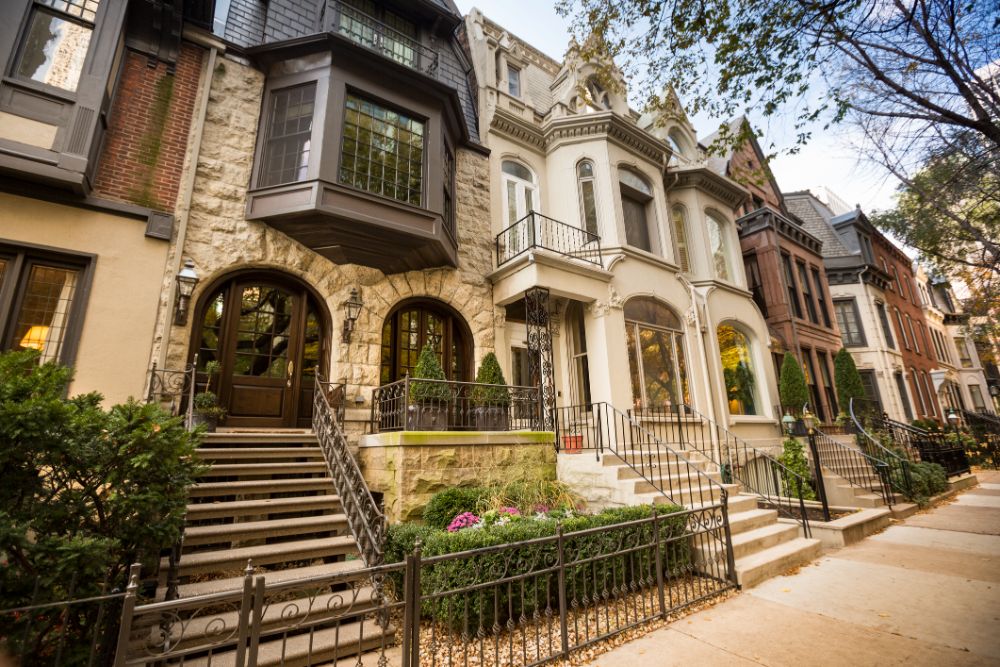
Chicago ranks third among the most populous cities in the US with over 2.7 million residents, after New York and Los Angeles. However, the Windy City’s edge lies in the cost and comfort of living here. The city has a lot to offer such as an efficient public transportation systems, easily bike-able, and has been named among the top 10 most walkable large cities in the country.
Chicago also is famously known for its unique architecture styles.
If you’re scouting for a home of your own in Chicago, here’s a guide to help you in your search:
Snapshot of Iconic Chicago Homes
While new options have been built between 2010-2021, most homes described below showcase the plethora of iconic architecture that has defined Chicago residences for many years.
- Bungalow: In the early 1900s, Chicago saw a spike in population growth – the fastest in the country. To provide sufficient housing, the famous Chicago Bungalow was created. Today, it makes up one-third of singlefamily houses throughout the city. Consisting of brick, the Bungalow is a one-and-a-half-level structure with street-facing verandas and spacious basements.
- Worker’s Cottage: This Chicago home first appeared in the early 1800s and became a staple well into the 20th century. The earlier designs mainly utilized wood but modern iterations started incorporating materials like brick. Worker’s Cottage is a gable-roofed house style and much like the Bungalow, it is usually one-and-a-half levels in height. The buildings are long and narrow to fit small city lots which are typically 25 ft. by 125 ft. The Worker’s Cottages are still a common sight in neighborhoods like Bucktown and Wicker Park.
- Frame Two-Flats (As well as Four-Flat and Six-Flat): These resident types make up more than 30% of Chicago’s housing stock. This was another popular type of housing in the early 1900s that was constructed using a combination of brick, wood, and stone. Homeowners would sometimes rent out the first or second floor to tenants. The timeless Chicago design of the Frame Two Flat has lasted for a hundred years and can still be found in certain neighborhoods such as Brighton Park, Pilsen, and North and South Lawndale.
- Chicago Greystone’s: Compared to the previous architecture styles on this list, the Chicago Greystone allows for a bit more space — a single-family or multi-family option is possible. Greystone’s typically have a wide bow of projecting windows, rounded or squared off, and a long narrow building shape (with each unit running from front to the back of the building). It is known for its limestone façade and it comes in a variety of ornamentation styles like classical revival and prairie style.
Real Estate Financial Forecast
Pre-COVID, the average home price would typically be in the $220,000 mark. Upon the onset of the pandemic, that figure has now increased to around $270,000, according to Zillow.
This year, home values are expected to further rise by approximately 4%. Despite this, the price tag on a Chicago home is still lower compared to those of residences in other major US cities.
On Home-buying during colder months
Homebuyers looking for the best deal can use the weather to their advantage. Chicago, after all, isn’t called the Windy City for nothing. Winter temperatures here can plunge to as low as 18 degrees – not exactly the best weather to go house-hunting. With fewer buyers willing to brave the chilly climate, home sellers opt to lower their prices to attract those remaining buyers.
Note, though, that the pandemic has changed the rules of the game in the sale and purchase of homes. With the advent of virtual home tours that don’t require in-person viewings, the weather is no longer much of a factor as it was before the threat of COVID. Real estate markets throughout the country are seeing higher buyer demand and a lower inventory. To assure you get the best deal it is always advisable to work with a talented, trusted Real Estate agent.
Our team of professional licensed agents would love to help you out with your home buying goals in Chicago. United Realty Group is known to go above and beyond in surpassing our client’s expectations. Give us a call, 888.964.1977. You can also reach us by email, info(at)united(dotted)re.